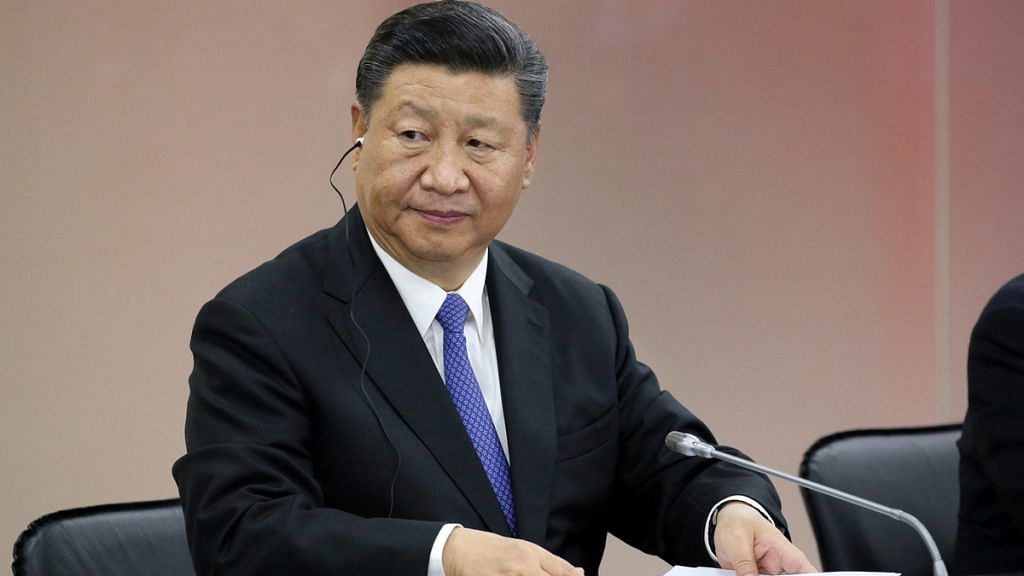New Delhi: The Chinese military operation in Ladakh, which has resulted in a month-long standoff with Indian troops, has been sanctioned by President Xi Jinping himself, according Jayadeva Ranade, former member of the National Security Advisory Board and an expert on the neighbouring country.
Ranade, now president of think-tank Centre for China Analysis and Strategy (CCAS), said India should not be in a hurry to settle the issue just to quieten down things. He added that the fresh tensions are a major and serious issue, because they come after the two big meetings between PM Narendra Modi and the Chinese President since the Doklam stand-off — Wuhan summit in 2018 and the Mamallapuram meeting near Chennai last year.
“For a military operation of the kind we have seen, regardless of whether there is any gunfire or not, the fact that the Chinese have deployed troops all across our northern border means that a number of forces have been brought up and there has been considerable planning,” Ranade told ThePrint.
“This has to have been cleared by the Central Military Commission headed by President Xi Jinping, if not initiated by him. That is why I say it is quite different from the previous standoffs. And we have to keep this in mind,” he said.
Also read: China is on the defensive and has adopted ‘wolf warrior’ diplomacy. Here’s what it means
Xi’s grip on PLA
Ranade, a former additional secretary in the Cabinet Secretariat, said there is little doubt that President Xi has a firm grip on the People’s Liberation Army (PLA). He underlined that he is not suggesting that everyone in the PLA is supportive of Xi because off and on, it comes out that certain generals have been dismissed on various grounds.
“Obviously there is some element of either opposition or something that Xi Jinping is dissatisfied with. Otherwise, by and large, he has a grip on the PLA. Virtually all the generals in place now have been appointed by him in his tenure, and he is also now the Commander-in-Chief,” he said.
Ranade explained that unlike in India where the President is also the Commander-in-Chief of the armed forces, Xi holds the functional operational post of commander.
“There is no doubt that he is not only in the picture, but was very much involved in the planning of this entire exercise,” he said, adding that one should not forget the issue of Nepal raising its border dispute with India.
Consolidation of Xi’s position in China
Ranade said there are many factors for Xi carrying out this action, including consolidation of his position within China.
“The (India-China) relationship itself has been, if I may use the term, deteriorating or sliding. There are many factors for this, some which the Chinese share. If we are looking for a time period, we need to look at April 2015, when Xi flew to Islamabad and announced the China-Pakistan Economic Corridor,” he said.
“Since that date, Chinese have been telling us at the official level, at the level of think-tanks, at the level of track-one-and-a-half, that resume your talks with Pakistan, resolve the Kashmir issue, and then look to improve relations with China. It has been that explicit and has been steady. That is one factor.”
Also read: Remember Vajpayee-Nehru episode? That is why Congress must let Modi off the hook on China
Military talks
On the talks set to take place between divisional commanders of the Indian and Chinese armies this Saturday, Ranade said it indicates that the matter is serious, and that the military is taking it seriously and is prepared for a long-drawn process.
“It is a good sign that they are meeting and talking… I hope that the fact that they are meeting at this level after a series of preparatory meetings at lower levels is not an indication or does not hint at a desire to settle matters quickly. We should settle it, but with the status quo ante — everyone goes back to where they were,” he said.
“I don’t think our armed forces should be in a hurry to settle just to quieten things down. I don’t think that should be the government’s position either, nor do I think it is.”
Ranade said the bigger question is why China actually carried out this operation, because it involves a lot of planning and money.
“Was it to test our responses in multiple places? If yes, then it is a preparation for something else. Or was it just a message that we can do what we can at any time? If it is the latter, it is a very expensive way of communicating,” he said.
Also read: India, China need to break stalemate, greater challenges ahead: Former envoy Ashok Kantha
